Mobile Devices in Schools: Learning, Future, Challenges and Planning
VerifiedAdded on 2023/01/11
|9
|2686
|41
Essay
AI Summary
This essay delves into the role of mobile devices in educational settings, examining their potential to enhance learning while also acknowledging the challenges they present. The introduction establishes the context of digital technology and its application in education, followed by a discussion on how mobile devices can be used to support learning. The essay presents arguments for the use of mobile devices, highlighting features like audio recording for feedback and live polling tools for formative assessment. It addresses the perspectives of parents and schools, discussing the debate around mobile device bans and the need for strategic planning. The essay also uses futures thinking methods, such as the future wheel and causal layered analysis, to explore the future implications of mobile device usage. It concludes with a call for balanced planning, considering the positive and negative impacts of mobile devices to create a preferable future for students and schools.

Pillar Essay
Paraphrase This Document
Need a fresh take? Get an instant paraphrase of this document with our AI Paraphraser

Table of Contents
Introduction......................................................................................................................................3
Main Body.......................................................................................................................................3
Conclusion.......................................................................................................................................3
References........................................................................................................................................4
Introduction......................................................................................................................................3
Main Body.......................................................................................................................................3
Conclusion.......................................................................................................................................3
References........................................................................................................................................4
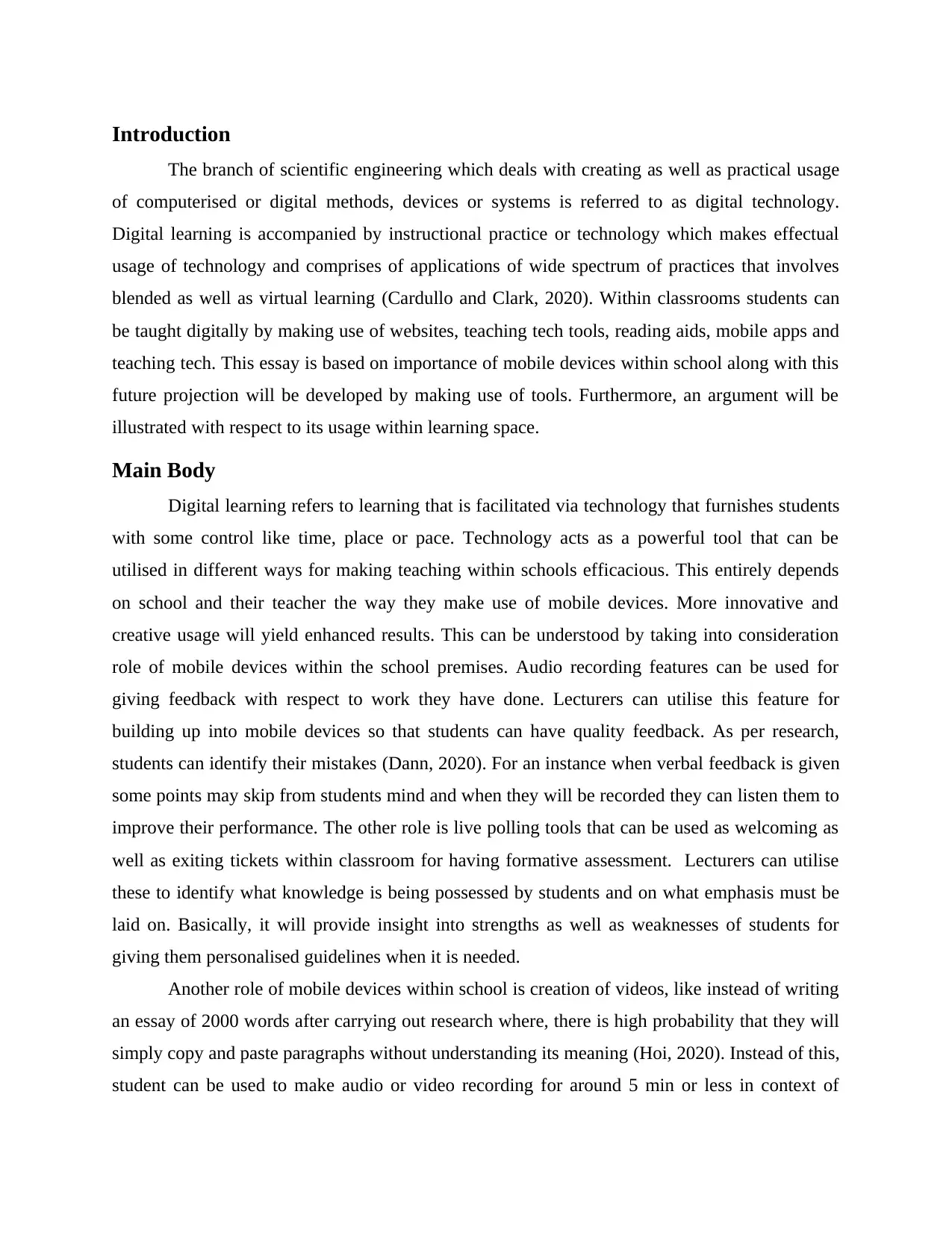
Introduction
The branch of scientific engineering which deals with creating as well as practical usage
of computerised or digital methods, devices or systems is referred to as digital technology.
Digital learning is accompanied by instructional practice or technology which makes effectual
usage of technology and comprises of applications of wide spectrum of practices that involves
blended as well as virtual learning (Cardullo and Clark, 2020). Within classrooms students can
be taught digitally by making use of websites, teaching tech tools, reading aids, mobile apps and
teaching tech. This essay is based on importance of mobile devices within school along with this
future projection will be developed by making use of tools. Furthermore, an argument will be
illustrated with respect to its usage within learning space.
Main Body
Digital learning refers to learning that is facilitated via technology that furnishes students
with some control like time, place or pace. Technology acts as a powerful tool that can be
utilised in different ways for making teaching within schools efficacious. This entirely depends
on school and their teacher the way they make use of mobile devices. More innovative and
creative usage will yield enhanced results. This can be understood by taking into consideration
role of mobile devices within the school premises. Audio recording features can be used for
giving feedback with respect to work they have done. Lecturers can utilise this feature for
building up into mobile devices so that students can have quality feedback. As per research,
students can identify their mistakes (Dann, 2020). For an instance when verbal feedback is given
some points may skip from students mind and when they will be recorded they can listen them to
improve their performance. The other role is live polling tools that can be used as welcoming as
well as exiting tickets within classroom for having formative assessment. Lecturers can utilise
these to identify what knowledge is being possessed by students and on what emphasis must be
laid on. Basically, it will provide insight into strengths as well as weaknesses of students for
giving them personalised guidelines when it is needed.
Another role of mobile devices within school is creation of videos, like instead of writing
an essay of 2000 words after carrying out research where, there is high probability that they will
simply copy and paste paragraphs without understanding its meaning (Hoi, 2020). Instead of this,
student can be used to make audio or video recording for around 5 min or less in context of
The branch of scientific engineering which deals with creating as well as practical usage
of computerised or digital methods, devices or systems is referred to as digital technology.
Digital learning is accompanied by instructional practice or technology which makes effectual
usage of technology and comprises of applications of wide spectrum of practices that involves
blended as well as virtual learning (Cardullo and Clark, 2020). Within classrooms students can
be taught digitally by making use of websites, teaching tech tools, reading aids, mobile apps and
teaching tech. This essay is based on importance of mobile devices within school along with this
future projection will be developed by making use of tools. Furthermore, an argument will be
illustrated with respect to its usage within learning space.
Main Body
Digital learning refers to learning that is facilitated via technology that furnishes students
with some control like time, place or pace. Technology acts as a powerful tool that can be
utilised in different ways for making teaching within schools efficacious. This entirely depends
on school and their teacher the way they make use of mobile devices. More innovative and
creative usage will yield enhanced results. This can be understood by taking into consideration
role of mobile devices within the school premises. Audio recording features can be used for
giving feedback with respect to work they have done. Lecturers can utilise this feature for
building up into mobile devices so that students can have quality feedback. As per research,
students can identify their mistakes (Dann, 2020). For an instance when verbal feedback is given
some points may skip from students mind and when they will be recorded they can listen them to
improve their performance. The other role is live polling tools that can be used as welcoming as
well as exiting tickets within classroom for having formative assessment. Lecturers can utilise
these to identify what knowledge is being possessed by students and on what emphasis must be
laid on. Basically, it will provide insight into strengths as well as weaknesses of students for
giving them personalised guidelines when it is needed.
Another role of mobile devices within school is creation of videos, like instead of writing
an essay of 2000 words after carrying out research where, there is high probability that they will
simply copy and paste paragraphs without understanding its meaning (Hoi, 2020). Instead of this,
student can be used to make audio or video recording for around 5 min or less in context of
⊘ This is a preview!⊘
Do you want full access?
Subscribe today to unlock all pages.

Trusted by 1+ million students worldwide
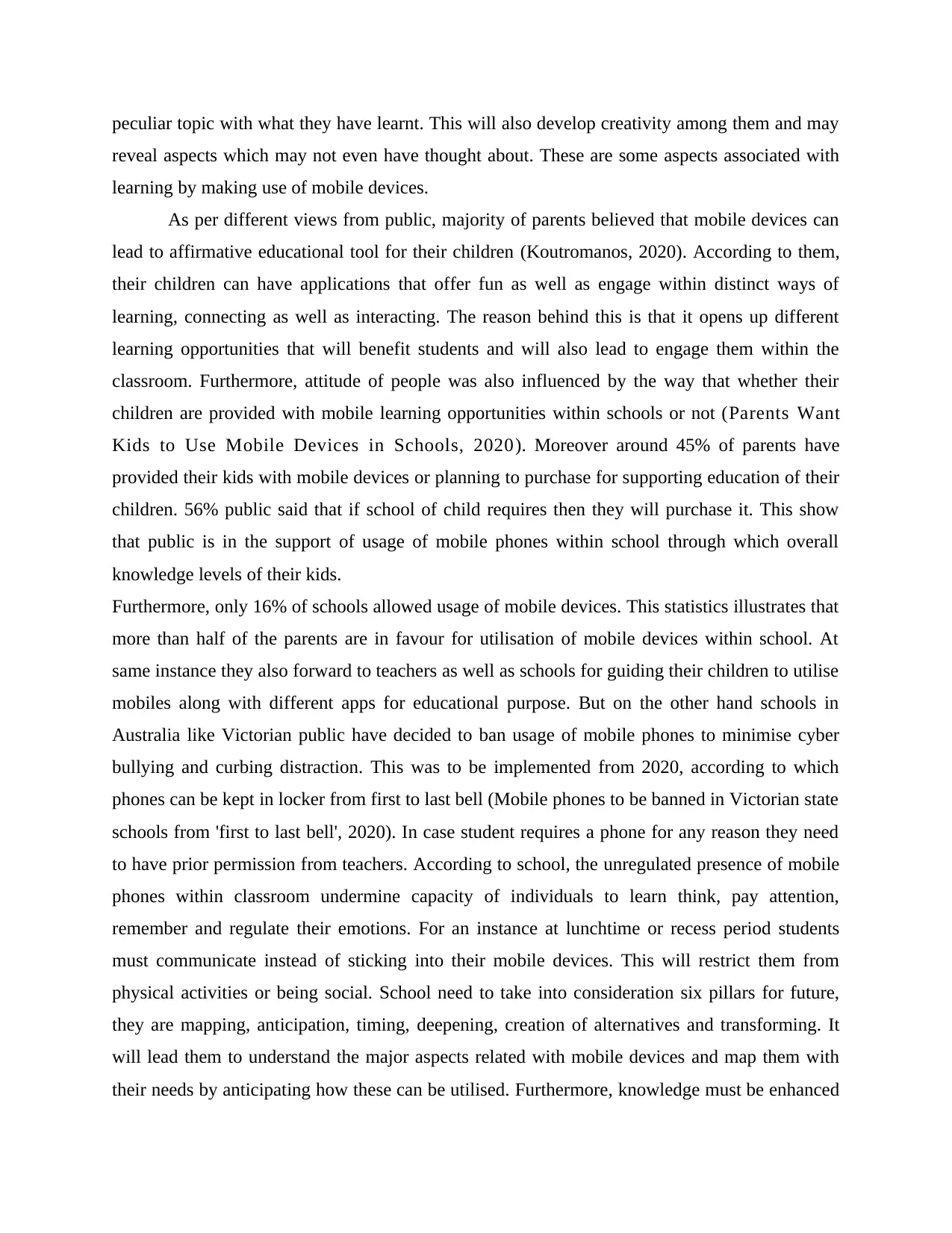
peculiar topic with what they have learnt. This will also develop creativity among them and may
reveal aspects which may not even have thought about. These are some aspects associated with
learning by making use of mobile devices.
As per different views from public, majority of parents believed that mobile devices can
lead to affirmative educational tool for their children (Koutromanos, 2020). According to them,
their children can have applications that offer fun as well as engage within distinct ways of
learning, connecting as well as interacting. The reason behind this is that it opens up different
learning opportunities that will benefit students and will also lead to engage them within the
classroom. Furthermore, attitude of people was also influenced by the way that whether their
children are provided with mobile learning opportunities within schools or not (Parents Want
Kids to Use Mobile Devices in Schools, 2020). Moreover around 45% of parents have
provided their kids with mobile devices or planning to purchase for supporting education of their
children. 56% public said that if school of child requires then they will purchase it. This show
that public is in the support of usage of mobile phones within school through which overall
knowledge levels of their kids.
Furthermore, only 16% of schools allowed usage of mobile devices. This statistics illustrates that
more than half of the parents are in favour for utilisation of mobile devices within school. At
same instance they also forward to teachers as well as schools for guiding their children to utilise
mobiles along with different apps for educational purpose. But on the other hand schools in
Australia like Victorian public have decided to ban usage of mobile phones to minimise cyber
bullying and curbing distraction. This was to be implemented from 2020, according to which
phones can be kept in locker from first to last bell (Mobile phones to be banned in Victorian state
schools from 'first to last bell', 2020). In case student requires a phone for any reason they need
to have prior permission from teachers. According to school, the unregulated presence of mobile
phones within classroom undermine capacity of individuals to learn think, pay attention,
remember and regulate their emotions. For an instance at lunchtime or recess period students
must communicate instead of sticking into their mobile devices. This will restrict them from
physical activities or being social. School need to take into consideration six pillars for future,
they are mapping, anticipation, timing, deepening, creation of alternatives and transforming. It
will lead them to understand the major aspects related with mobile devices and map them with
their needs by anticipating how these can be utilised. Furthermore, knowledge must be enhanced
reveal aspects which may not even have thought about. These are some aspects associated with
learning by making use of mobile devices.
As per different views from public, majority of parents believed that mobile devices can
lead to affirmative educational tool for their children (Koutromanos, 2020). According to them,
their children can have applications that offer fun as well as engage within distinct ways of
learning, connecting as well as interacting. The reason behind this is that it opens up different
learning opportunities that will benefit students and will also lead to engage them within the
classroom. Furthermore, attitude of people was also influenced by the way that whether their
children are provided with mobile learning opportunities within schools or not (Parents Want
Kids to Use Mobile Devices in Schools, 2020). Moreover around 45% of parents have
provided their kids with mobile devices or planning to purchase for supporting education of their
children. 56% public said that if school of child requires then they will purchase it. This show
that public is in the support of usage of mobile phones within school through which overall
knowledge levels of their kids.
Furthermore, only 16% of schools allowed usage of mobile devices. This statistics illustrates that
more than half of the parents are in favour for utilisation of mobile devices within school. At
same instance they also forward to teachers as well as schools for guiding their children to utilise
mobiles along with different apps for educational purpose. But on the other hand schools in
Australia like Victorian public have decided to ban usage of mobile phones to minimise cyber
bullying and curbing distraction. This was to be implemented from 2020, according to which
phones can be kept in locker from first to last bell (Mobile phones to be banned in Victorian state
schools from 'first to last bell', 2020). In case student requires a phone for any reason they need
to have prior permission from teachers. According to school, the unregulated presence of mobile
phones within classroom undermine capacity of individuals to learn think, pay attention,
remember and regulate their emotions. For an instance at lunchtime or recess period students
must communicate instead of sticking into their mobile devices. This will restrict them from
physical activities or being social. School need to take into consideration six pillars for future,
they are mapping, anticipation, timing, deepening, creation of alternatives and transforming. It
will lead them to understand the major aspects related with mobile devices and map them with
their needs by anticipating how these can be utilised. Furthermore, knowledge must be enhanced
Paraphrase This Document
Need a fresh take? Get an instant paraphrase of this document with our AI Paraphraser
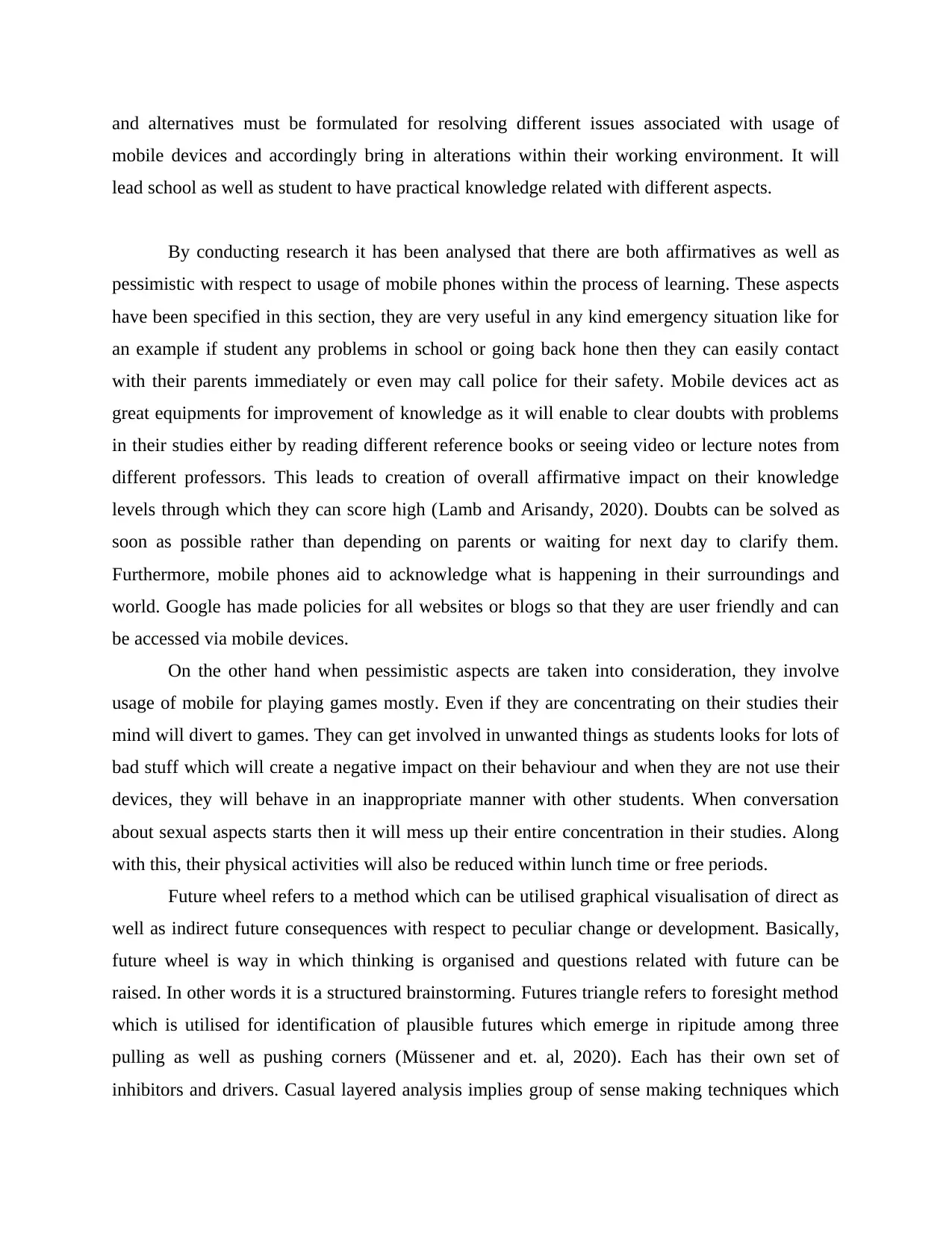
and alternatives must be formulated for resolving different issues associated with usage of
mobile devices and accordingly bring in alterations within their working environment. It will
lead school as well as student to have practical knowledge related with different aspects.
By conducting research it has been analysed that there are both affirmatives as well as
pessimistic with respect to usage of mobile phones within the process of learning. These aspects
have been specified in this section, they are very useful in any kind emergency situation like for
an example if student any problems in school or going back hone then they can easily contact
with their parents immediately or even may call police for their safety. Mobile devices act as
great equipments for improvement of knowledge as it will enable to clear doubts with problems
in their studies either by reading different reference books or seeing video or lecture notes from
different professors. This leads to creation of overall affirmative impact on their knowledge
levels through which they can score high (Lamb and Arisandy, 2020). Doubts can be solved as
soon as possible rather than depending on parents or waiting for next day to clarify them.
Furthermore, mobile phones aid to acknowledge what is happening in their surroundings and
world. Google has made policies for all websites or blogs so that they are user friendly and can
be accessed via mobile devices.
On the other hand when pessimistic aspects are taken into consideration, they involve
usage of mobile for playing games mostly. Even if they are concentrating on their studies their
mind will divert to games. They can get involved in unwanted things as students looks for lots of
bad stuff which will create a negative impact on their behaviour and when they are not use their
devices, they will behave in an inappropriate manner with other students. When conversation
about sexual aspects starts then it will mess up their entire concentration in their studies. Along
with this, their physical activities will also be reduced within lunch time or free periods.
Future wheel refers to a method which can be utilised graphical visualisation of direct as
well as indirect future consequences with respect to peculiar change or development. Basically,
future wheel is way in which thinking is organised and questions related with future can be
raised. In other words it is a structured brainstorming. Futures triangle refers to foresight method
which is utilised for identification of plausible futures which emerge in ripitude among three
pulling as well as pushing corners (Müssener and et. al, 2020). Each has their own set of
inhibitors and drivers. Casual layered analysis implies group of sense making techniques which
mobile devices and accordingly bring in alterations within their working environment. It will
lead school as well as student to have practical knowledge related with different aspects.
By conducting research it has been analysed that there are both affirmatives as well as
pessimistic with respect to usage of mobile phones within the process of learning. These aspects
have been specified in this section, they are very useful in any kind emergency situation like for
an example if student any problems in school or going back hone then they can easily contact
with their parents immediately or even may call police for their safety. Mobile devices act as
great equipments for improvement of knowledge as it will enable to clear doubts with problems
in their studies either by reading different reference books or seeing video or lecture notes from
different professors. This leads to creation of overall affirmative impact on their knowledge
levels through which they can score high (Lamb and Arisandy, 2020). Doubts can be solved as
soon as possible rather than depending on parents or waiting for next day to clarify them.
Furthermore, mobile phones aid to acknowledge what is happening in their surroundings and
world. Google has made policies for all websites or blogs so that they are user friendly and can
be accessed via mobile devices.
On the other hand when pessimistic aspects are taken into consideration, they involve
usage of mobile for playing games mostly. Even if they are concentrating on their studies their
mind will divert to games. They can get involved in unwanted things as students looks for lots of
bad stuff which will create a negative impact on their behaviour and when they are not use their
devices, they will behave in an inappropriate manner with other students. When conversation
about sexual aspects starts then it will mess up their entire concentration in their studies. Along
with this, their physical activities will also be reduced within lunch time or free periods.
Future wheel refers to a method which can be utilised graphical visualisation of direct as
well as indirect future consequences with respect to peculiar change or development. Basically,
future wheel is way in which thinking is organised and questions related with future can be
raised. In other words it is a structured brainstorming. Futures triangle refers to foresight method
which is utilised for identification of plausible futures which emerge in ripitude among three
pulling as well as pushing corners (Müssener and et. al, 2020). Each has their own set of
inhibitors and drivers. Casual layered analysis implies group of sense making techniques which
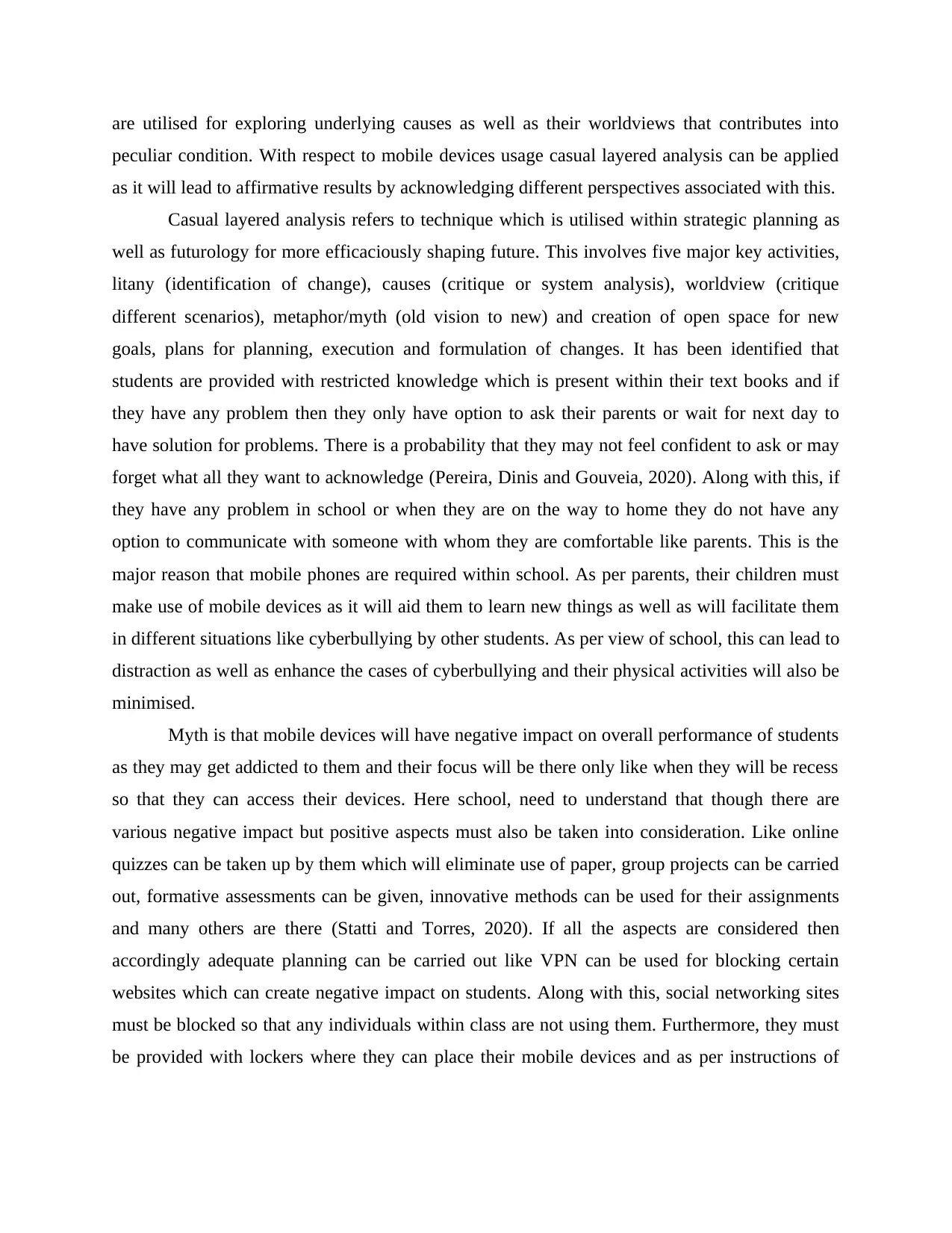
are utilised for exploring underlying causes as well as their worldviews that contributes into
peculiar condition. With respect to mobile devices usage casual layered analysis can be applied
as it will lead to affirmative results by acknowledging different perspectives associated with this.
Casual layered analysis refers to technique which is utilised within strategic planning as
well as futurology for more efficaciously shaping future. This involves five major key activities,
litany (identification of change), causes (critique or system analysis), worldview (critique
different scenarios), metaphor/myth (old vision to new) and creation of open space for new
goals, plans for planning, execution and formulation of changes. It has been identified that
students are provided with restricted knowledge which is present within their text books and if
they have any problem then they only have option to ask their parents or wait for next day to
have solution for problems. There is a probability that they may not feel confident to ask or may
forget what all they want to acknowledge (Pereira, Dinis and Gouveia, 2020). Along with this, if
they have any problem in school or when they are on the way to home they do not have any
option to communicate with someone with whom they are comfortable like parents. This is the
major reason that mobile phones are required within school. As per parents, their children must
make use of mobile devices as it will aid them to learn new things as well as will facilitate them
in different situations like cyberbullying by other students. As per view of school, this can lead to
distraction as well as enhance the cases of cyberbullying and their physical activities will also be
minimised.
Myth is that mobile devices will have negative impact on overall performance of students
as they may get addicted to them and their focus will be there only like when they will be recess
so that they can access their devices. Here school, need to understand that though there are
various negative impact but positive aspects must also be taken into consideration. Like online
quizzes can be taken up by them which will eliminate use of paper, group projects can be carried
out, formative assessments can be given, innovative methods can be used for their assignments
and many others are there (Statti and Torres, 2020). If all the aspects are considered then
accordingly adequate planning can be carried out like VPN can be used for blocking certain
websites which can create negative impact on students. Along with this, social networking sites
must be blocked so that any individuals within class are not using them. Furthermore, they must
be provided with lockers where they can place their mobile devices and as per instructions of
peculiar condition. With respect to mobile devices usage casual layered analysis can be applied
as it will lead to affirmative results by acknowledging different perspectives associated with this.
Casual layered analysis refers to technique which is utilised within strategic planning as
well as futurology for more efficaciously shaping future. This involves five major key activities,
litany (identification of change), causes (critique or system analysis), worldview (critique
different scenarios), metaphor/myth (old vision to new) and creation of open space for new
goals, plans for planning, execution and formulation of changes. It has been identified that
students are provided with restricted knowledge which is present within their text books and if
they have any problem then they only have option to ask their parents or wait for next day to
have solution for problems. There is a probability that they may not feel confident to ask or may
forget what all they want to acknowledge (Pereira, Dinis and Gouveia, 2020). Along with this, if
they have any problem in school or when they are on the way to home they do not have any
option to communicate with someone with whom they are comfortable like parents. This is the
major reason that mobile phones are required within school. As per parents, their children must
make use of mobile devices as it will aid them to learn new things as well as will facilitate them
in different situations like cyberbullying by other students. As per view of school, this can lead to
distraction as well as enhance the cases of cyberbullying and their physical activities will also be
minimised.
Myth is that mobile devices will have negative impact on overall performance of students
as they may get addicted to them and their focus will be there only like when they will be recess
so that they can access their devices. Here school, need to understand that though there are
various negative impact but positive aspects must also be taken into consideration. Like online
quizzes can be taken up by them which will eliminate use of paper, group projects can be carried
out, formative assessments can be given, innovative methods can be used for their assignments
and many others are there (Statti and Torres, 2020). If all the aspects are considered then
accordingly adequate planning can be carried out like VPN can be used for blocking certain
websites which can create negative impact on students. Along with this, social networking sites
must be blocked so that any individuals within class are not using them. Furthermore, they must
be provided with lockers where they can place their mobile devices and as per instructions of
⊘ This is a preview!⊘
Do you want full access?
Subscribe today to unlock all pages.

Trusted by 1+ million students worldwide
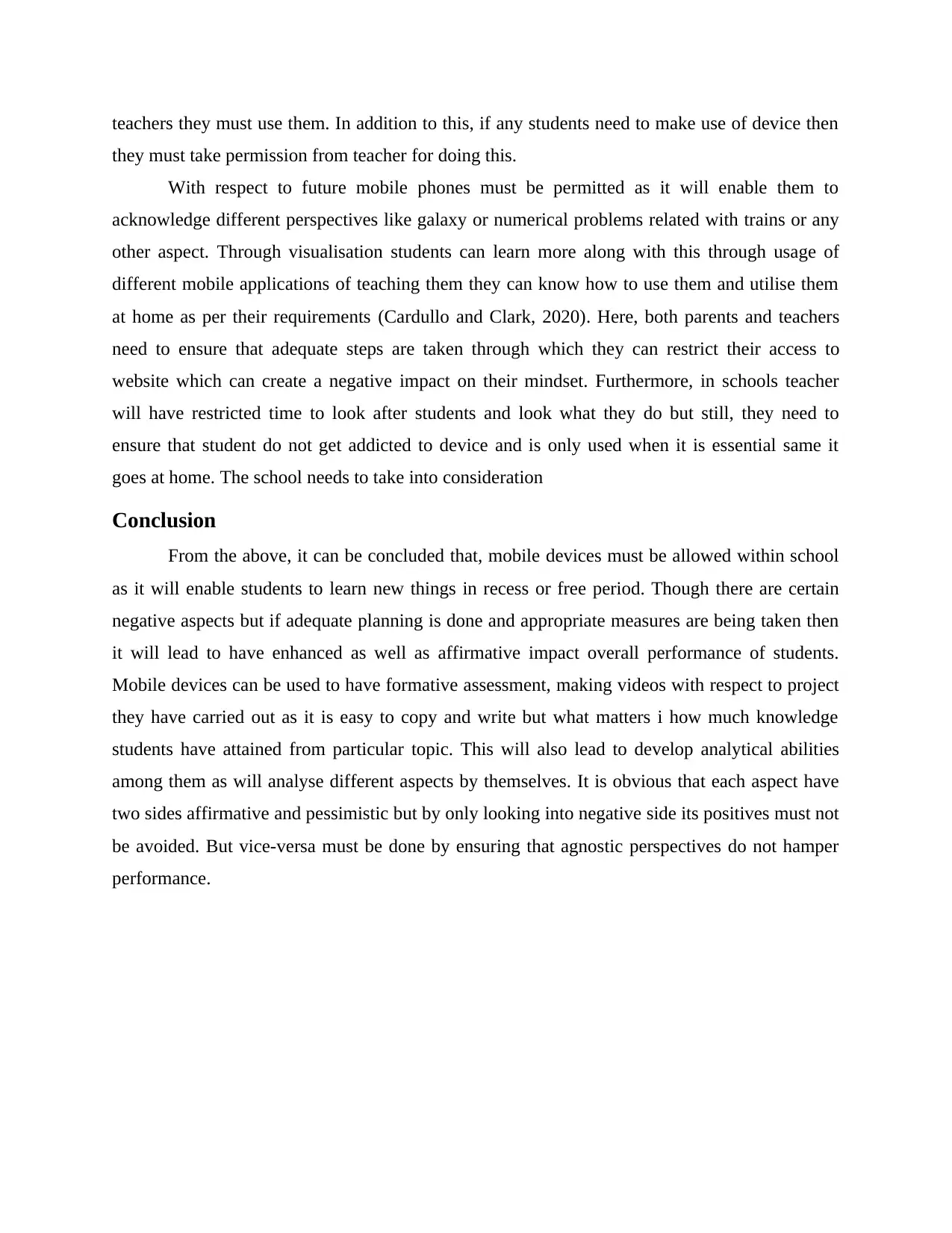
teachers they must use them. In addition to this, if any students need to make use of device then
they must take permission from teacher for doing this.
With respect to future mobile phones must be permitted as it will enable them to
acknowledge different perspectives like galaxy or numerical problems related with trains or any
other aspect. Through visualisation students can learn more along with this through usage of
different mobile applications of teaching them they can know how to use them and utilise them
at home as per their requirements (Cardullo and Clark, 2020). Here, both parents and teachers
need to ensure that adequate steps are taken through which they can restrict their access to
website which can create a negative impact on their mindset. Furthermore, in schools teacher
will have restricted time to look after students and look what they do but still, they need to
ensure that student do not get addicted to device and is only used when it is essential same it
goes at home. The school needs to take into consideration
Conclusion
From the above, it can be concluded that, mobile devices must be allowed within school
as it will enable students to learn new things in recess or free period. Though there are certain
negative aspects but if adequate planning is done and appropriate measures are being taken then
it will lead to have enhanced as well as affirmative impact overall performance of students.
Mobile devices can be used to have formative assessment, making videos with respect to project
they have carried out as it is easy to copy and write but what matters i how much knowledge
students have attained from particular topic. This will also lead to develop analytical abilities
among them as will analyse different aspects by themselves. It is obvious that each aspect have
two sides affirmative and pessimistic but by only looking into negative side its positives must not
be avoided. But vice-versa must be done by ensuring that agnostic perspectives do not hamper
performance.
they must take permission from teacher for doing this.
With respect to future mobile phones must be permitted as it will enable them to
acknowledge different perspectives like galaxy or numerical problems related with trains or any
other aspect. Through visualisation students can learn more along with this through usage of
different mobile applications of teaching them they can know how to use them and utilise them
at home as per their requirements (Cardullo and Clark, 2020). Here, both parents and teachers
need to ensure that adequate steps are taken through which they can restrict their access to
website which can create a negative impact on their mindset. Furthermore, in schools teacher
will have restricted time to look after students and look what they do but still, they need to
ensure that student do not get addicted to device and is only used when it is essential same it
goes at home. The school needs to take into consideration
Conclusion
From the above, it can be concluded that, mobile devices must be allowed within school
as it will enable students to learn new things in recess or free period. Though there are certain
negative aspects but if adequate planning is done and appropriate measures are being taken then
it will lead to have enhanced as well as affirmative impact overall performance of students.
Mobile devices can be used to have formative assessment, making videos with respect to project
they have carried out as it is easy to copy and write but what matters i how much knowledge
students have attained from particular topic. This will also lead to develop analytical abilities
among them as will analyse different aspects by themselves. It is obvious that each aspect have
two sides affirmative and pessimistic but by only looking into negative side its positives must not
be avoided. But vice-versa must be done by ensuring that agnostic perspectives do not hamper
performance.
Paraphrase This Document
Need a fresh take? Get an instant paraphrase of this document with our AI Paraphraser

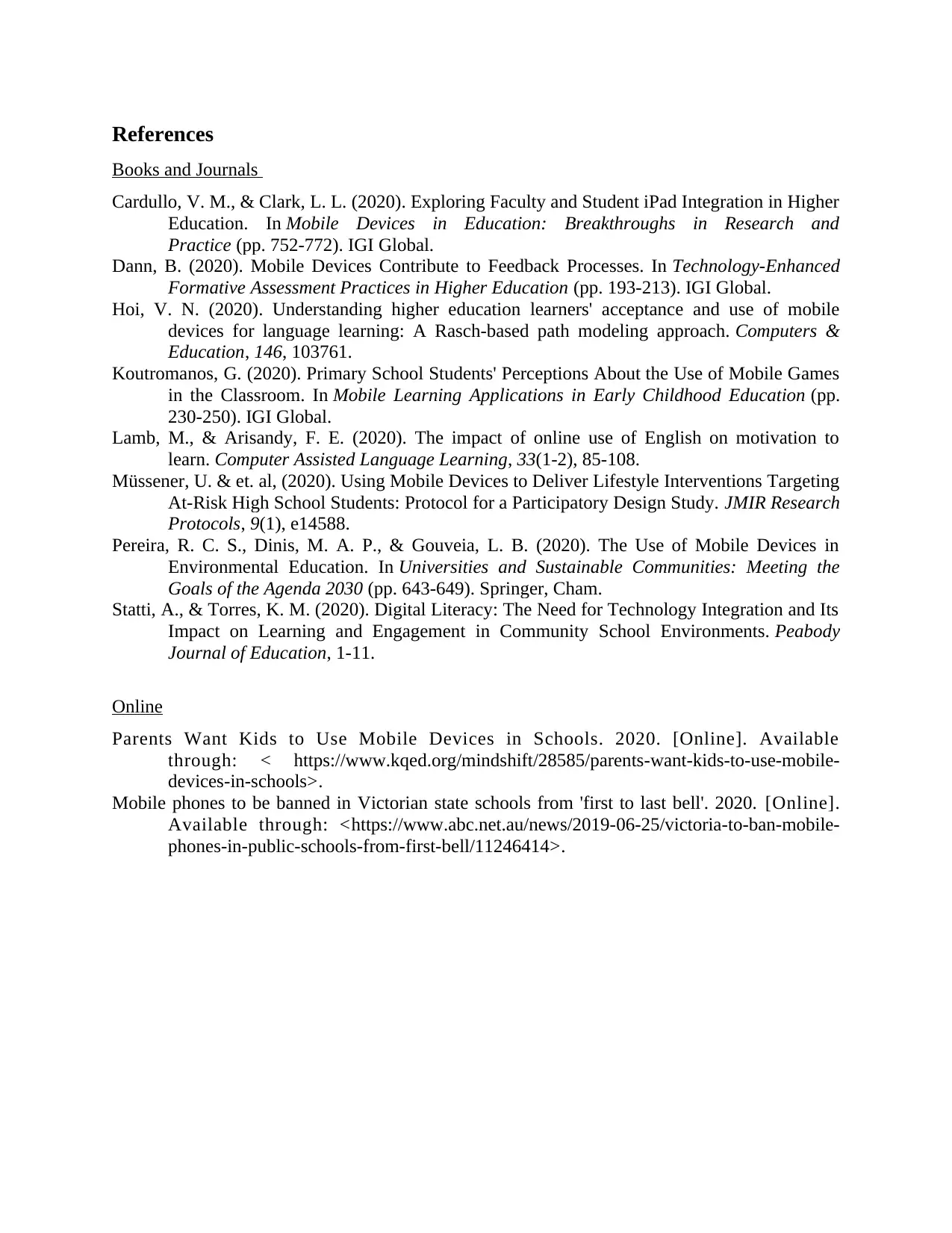
References
Books and Journals
Cardullo, V. M., & Clark, L. L. (2020). Exploring Faculty and Student iPad Integration in Higher
Education. In Mobile Devices in Education: Breakthroughs in Research and
Practice (pp. 752-772). IGI Global.
Dann, B. (2020). Mobile Devices Contribute to Feedback Processes. In Technology-Enhanced
Formative Assessment Practices in Higher Education (pp. 193-213). IGI Global.
Hoi, V. N. (2020). Understanding higher education learners' acceptance and use of mobile
devices for language learning: A Rasch-based path modeling approach. Computers &
Education, 146, 103761.
Koutromanos, G. (2020). Primary School Students' Perceptions About the Use of Mobile Games
in the Classroom. In Mobile Learning Applications in Early Childhood Education (pp.
230-250). IGI Global.
Lamb, M., & Arisandy, F. E. (2020). The impact of online use of English on motivation to
learn. Computer Assisted Language Learning, 33(1-2), 85-108.
Müssener, U. & et. al, (2020). Using Mobile Devices to Deliver Lifestyle Interventions Targeting
At-Risk High School Students: Protocol for a Participatory Design Study. JMIR Research
Protocols, 9(1), e14588.
Pereira, R. C. S., Dinis, M. A. P., & Gouveia, L. B. (2020). The Use of Mobile Devices in
Environmental Education. In Universities and Sustainable Communities: Meeting the
Goals of the Agenda 2030 (pp. 643-649). Springer, Cham.
Statti, A., & Torres, K. M. (2020). Digital Literacy: The Need for Technology Integration and Its
Impact on Learning and Engagement in Community School Environments. Peabody
Journal of Education, 1-11.
Online
Parents Want Kids to Use Mobile Devices in Schools. 2020. [Online]. Available
through: < https://www.kqed.org/mindshift/28585/parents-want-kids-to-use-mobile-
devices-in-schools>.
Mobile phones to be banned in Victorian state schools from 'first to last bell'. 2020. [Online].
Available through: <https://www.abc.net.au/news/2019-06-25/victoria-to-ban-mobile-
phones-in-public-schools-from-first-bell/11246414>.
Books and Journals
Cardullo, V. M., & Clark, L. L. (2020). Exploring Faculty and Student iPad Integration in Higher
Education. In Mobile Devices in Education: Breakthroughs in Research and
Practice (pp. 752-772). IGI Global.
Dann, B. (2020). Mobile Devices Contribute to Feedback Processes. In Technology-Enhanced
Formative Assessment Practices in Higher Education (pp. 193-213). IGI Global.
Hoi, V. N. (2020). Understanding higher education learners' acceptance and use of mobile
devices for language learning: A Rasch-based path modeling approach. Computers &
Education, 146, 103761.
Koutromanos, G. (2020). Primary School Students' Perceptions About the Use of Mobile Games
in the Classroom. In Mobile Learning Applications in Early Childhood Education (pp.
230-250). IGI Global.
Lamb, M., & Arisandy, F. E. (2020). The impact of online use of English on motivation to
learn. Computer Assisted Language Learning, 33(1-2), 85-108.
Müssener, U. & et. al, (2020). Using Mobile Devices to Deliver Lifestyle Interventions Targeting
At-Risk High School Students: Protocol for a Participatory Design Study. JMIR Research
Protocols, 9(1), e14588.
Pereira, R. C. S., Dinis, M. A. P., & Gouveia, L. B. (2020). The Use of Mobile Devices in
Environmental Education. In Universities and Sustainable Communities: Meeting the
Goals of the Agenda 2030 (pp. 643-649). Springer, Cham.
Statti, A., & Torres, K. M. (2020). Digital Literacy: The Need for Technology Integration and Its
Impact on Learning and Engagement in Community School Environments. Peabody
Journal of Education, 1-11.
Online
Parents Want Kids to Use Mobile Devices in Schools. 2020. [Online]. Available
through: < https://www.kqed.org/mindshift/28585/parents-want-kids-to-use-mobile-
devices-in-schools>.
Mobile phones to be banned in Victorian state schools from 'first to last bell'. 2020. [Online].
Available through: <https://www.abc.net.au/news/2019-06-25/victoria-to-ban-mobile-
phones-in-public-schools-from-first-bell/11246414>.
⊘ This is a preview!⊘
Do you want full access?
Subscribe today to unlock all pages.

Trusted by 1+ million students worldwide
1 out of 9
Related Documents
Your All-in-One AI-Powered Toolkit for Academic Success.
+13062052269
info@desklib.com
Available 24*7 on WhatsApp / Email
![[object Object]](/_next/static/media/star-bottom.7253800d.svg)
Unlock your academic potential
Copyright © 2020–2026 A2Z Services. All Rights Reserved. Developed and managed by ZUCOL.





